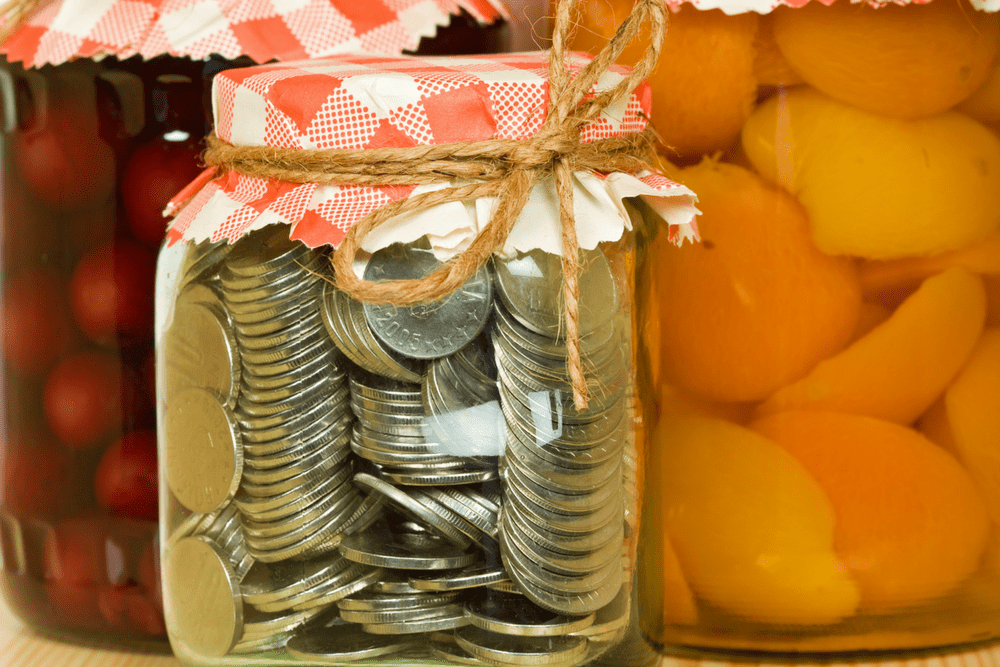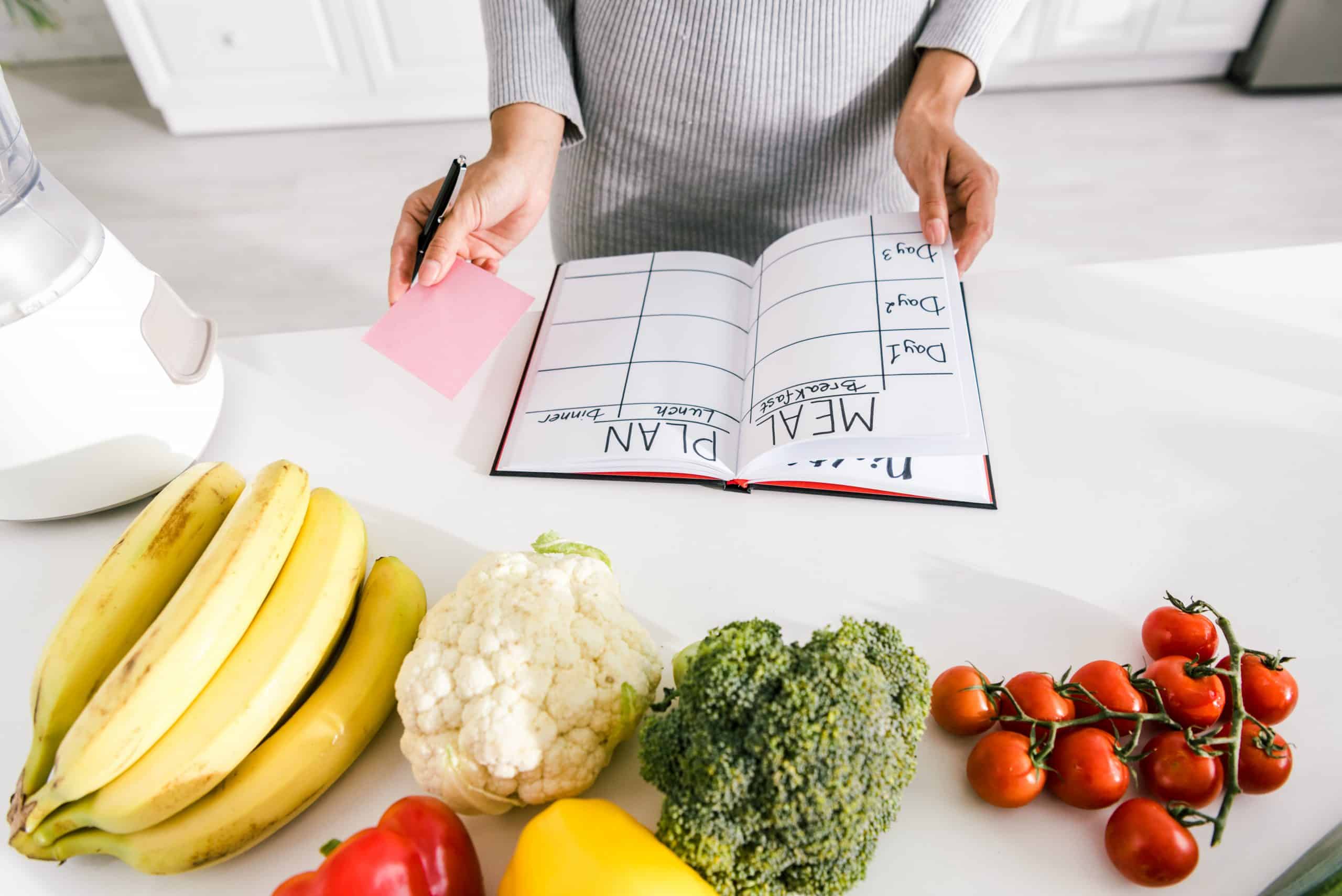Make this the year you make changes to your bad spending habits and have a positive impact on your household budget. It’s easier than you think. Check this list of tips for smart spending and pick a few money-saving strategies to try.
Definitely do not adopt them all at once, as you’re bound to get overwhelmed and give up. Tackle one at a time, incorporate the change into your routine and see if it fits your family’s lifestyle. Before you know it, you’ll be saving money hand over fist.

Photo: Deposit Photos
Whether you’re cutting costs in the kitchen or being more strategic about shopping, here’s our expert advice on how to break bad spending habits to save you money this year.
1. Make a budget
When you’re not aware of how much money you have and how much you’re spending, it’s easy to shop in ignorant bliss — and then be surprised by high credit card bills later. The best way to cure bad spending habits is to make a budget and track your spending. It will keep you honest and force you to make tough decisions in advance about what you can or can’t afford.
The process of creating a budget can be eye-opening. If you’re paying 50 percent of your income on rent, perhaps it’s time to find a cheaper living arrangement. Or, you might be surprised just how much you spend each month on coffee or fast food. It might be easier than you think to cut back when you see the numbers in black and white.
2. Evaluate every purchase
Impulse buys and shopping without thinking are common habits that lead to overspending. Before you buy anything new, whether it’s an article of clothing, a tool or a small appliance, delay the decision for a day and evaluate the new purchase.
Do you really need the new wardrobe item? Can you borrow the tool from a neighbor or use another tool you already own? Could you get the same item used at a lower price or even for free from a Buy Nothing group?
Some people refuse to add a new item to the household unless they discard something else. What old item will you discard if you buy something new? After this evaluation, you may decide not to make the purchase after all. A minimalist lifestyle might be extreme for some, but reducing the number of items you “need” — whether that’s clothes, toys or electronics — will decrease unnecessary expenses.

Photo: Deposit Photos
And when you do go shopping, make a habit of writing down a shopping list and only buying items on the list. That will keep you from in-store impulse buys.
3. Avoid fees and extra charges
Fees and penalty charges are needless expenses that are best avoided. You can easily save money by making sure you never have to pay these. Get cash at your bank to avoid ATM fees. Pay off credit cards every month to avoid interest fees, and pay other bills on time to avoid late charges.
Know your checking account balance so you don’t bounce checks. Return your library books on time, cancel doctor’s appointments more than 24 hours in advance, and otherwise avoid all penalty charges to keep your dollars in your pocket.
If you feel like you’re not organized enough to remember key payment dates, use a calendar app on your phone to stay on top of important deadlines.
4. Save on electricity and other utilities
It’s easy to waste money at home without realizing it. A light accidentally left on while you’re at the office or the thermostat turned up too high will increase your utility bills with no benefit to you.
Instead, adopt seasonal living habits to decrease your reliance on electricity for climate control. In winter, put on a heavy sweater and socks or slippers rather than turning up the heat, and block any cool air seeping in through doors or windows. In summer, do the opposite: wear cool, loose clothing and install a ceiling fan to help minimize your use of A/C.
Year-round, adjust your living habits to conserve energy; it’s good for the environment and is a smart strategy to save money! Before you open the refrigerator, think about what you need to get.
Buy energy-saving bulbs to replace incandescent bulbs; the initial cost may be higher, but you’ll save over time. Turn off the TV and go to bed rather than fall asleep with it still turned on.
Unplug phones and computers as soon as they are fully charged. Install a programmable thermostat for heating and air conditioning, and be sure to change the furnace air filter (quarterly or monthly). Turn lights and fans off when you leave a room.
5. Plan your meals
Most people spend a good deal of their budget on meals, from dining out to groceries. One smart money habit is to track your food expenses and take a hard look at where you can save. Meal planning is one of the best ways to keep grocery bills to a minimum.

Photo: Deposit Photos
Standardize a monthly menu of foods and recipes your family prefers, focusing on easy, made-from-scratch meals using inexpensive ingredients like beans and pasta. You’ll find several financial benefits. First, you’ll eat out less because you won’t order takeout every night you don’t feel like cooking or don’t have a dinner menu in mind.
You’ll reduce food waste because you have a plan for all your purchases and can buy your most-used ingredients in bulk during sales. And, you won’t have to resort to pricey prepared foods.
Plan to freeze any leftover meat and vegetables, which you can turn into a soup, stew or stir-fry at the end of the month to avoid waste. Make double portions and freeze whole dinners to save for a busy night when you don’t have time to cook.
To break any monotony, switch out ingredients in your stew or chili recipes and have “treat night” once a month, where you cook off menu or budget for a restaurant meal. Not only will you breaking your poor spending habits, but you’ll be eating healthier as well.
6. Reduce luxury beverages

Photo: Deposit Photos
Do you swing by Starbucks for a latte every morning? Enjoy a glass of wine every night at dinner, or confess to a Diet Coke addiction? These “luxury” beverages cost a lot and mainly add calories and sugar to your diet, rather than nutrition. Here are some cheaper alternatives.
Bottled water
Drink tap water, not bottled water, and use washable, refillable bottles for water on the go. If your tap water tastes bad or you have concerns about municipal water, buy bulk filtered water or consider installing a filter system in your home for drinking water.
Soda and juice
Reduce or eliminate your soda or juice consumption for the health of your body and your budget. Save soft drinks for special occasions rather than make it an everyday (or three times a day) drink. If you need to flavor or sweeten beverages, consider making fruit syrups using fresh or frozen fruits for delicious homemade soda drinks. To make soda, use one part syrup with seven parts club soda or seltzer over ice.
Coffee and tea
Brewing your own coffee and tea is cheaper than buying it from a café. (Don’t forget about free coffee at work!) Avoid flavored or instant coffees, tea bags, single serving sizes and drink mixes. Buy whole coffee beans in bulk that you grind yourself using an inexpensive grinder ($20 or less). Use a tea ball or infuser ($2 to $3) to brew loose-leaf tea. In summer months, brew extra coffee and tea in the morning to use later over ice; for sweetener, simply stir together equal parts sugar or honey and water.
Alcohol
Alcohol is expensive. Limit alcohol consumption to weekend dinners only or special occasions. We don’t miss it and the savings in our annual food budget are significant. When you must buy it, look for sales and specials.
7. Pay yourself first
Many people struggle to save because there’s no money left at the end of the month to go into a savings or investment account. One smart trick of financially savvy folks is to pay yourself first.
Earmark a certain dollar amount to transfer from your checking to your saving account after every payday. You’re less likely to dip into your savings to pay for an impromptu ice cream or new pair of shoes, so you’ll be forced to budget wisely from the money you have left in checking. Plus, you’ll be building a safety net for unexpected purchases, like home repairs.
Similarly, take advantage of any financial incentives offered by your employer. If they’ll match your contributions to a retirement account, make sure you’re putting in at least that much every paycheck. Not only are you paying yourself first, but you’re getting free money out of the deal. In addition, if your job will reimburse you for fitness, commuter or other expenses, or offers other complimentary services, be sure to take advantage, so you’re not losing out on freebies.
8. Use what you have
Take a good look at the stuff you already own before you plan a spending spree. You might be surprised how items can be repurposed, or even how they can bring you money.
For example, shop your closet before you hit the mall. Sometimes simply combining separates in a different way can create a “new” outfit and give you the same satisfaction as if you bought new clothes. If there are items you haven’t worn in years, see if you can consign them for cash or donate them to clear up space, so you don’t need to spend money on more storage bins.
Do you have an extra bedroom, outdoor shed or garage space? Consider renting it out to earn extra money. (Don’t forget to check with your homeowners’ insurance and homeowners’ association to make sure the rental is legit.)
9. Pay cash
Do you view your credit card as a source of free money, spending now and avoiding the consequences until the bill comes? One way to stop overspending with your credit card is to reserve your card for big purchases and mainly shop with cash.
When you’re heading to the supermarket or the mall, give yourself a cash budget and bring only that amount in bills. You can’t buy more than you have money to pay with, so it will keep your impulses in check. We recommend keeping your credit card on hand for true emergencies, but if that’s too much temptation, start out leaving it at home when you shop.
Plus, seeing your pile of dollars dwindle away can be more motivating than looking at numbers on a spreadsheet. Cash can be a good physical reminder that money is a limited resource that you want to make last as long as possible.
10. Never pay full price
You see something you like, and you want it now. But now might not be the best time to buy because the item you want is not on sale. With today’s coupon code sites, daily deals, holiday sales and loyalty programs, it’s easy to avoid paying full price for most things.
If you want to reduce your spending, you need to look for reduced prices. Sign up for emails from your favorite stores and restaurants, download apps and join loyalty programs for access to discounts and freebies. Take advantage of free kids meal nights at restaurants if you’re planning a meal out, and check if your library offers reduced-price admission passes to museums and other attractions in your area. Shop end-of-season sales and bargain bins.
Get to know sale cycles and track prices, so you know what’s a good price for the item you want and you can buy at the right time. You might need to wait a few weeks or even a few months to score that deal, but the savings will be worth the wait.
If you liked this post, you might enjoy:


One way I have saved a ton on items is to post a wanted ad on Freecycle before I buy something to see if someone has it. Many times the items are not posted but if someone reads my post they’ll say, “Hey, I have that in the back of the shed and I don’t need it!” I have saved hundreds of dollars on clothes for the kids, bikes, a/v equipment, etc.
We buy flavored coffee on sale for half off and grind it in store We store it in freezer and it retains freshness. We brew coffee for two days at once. What we heat up in Micro 2nd day is better than 1st day. Our c maker has aoto cut off